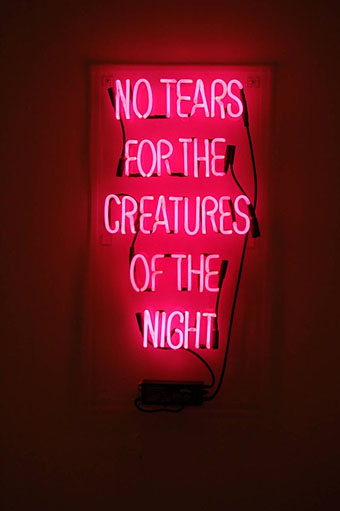
No Tears for the Creatures of the Night (2005) by Will Munro.
• Steve Barker’s On The Wire show on BBC Radio Lancashire is one of the longest-running music shows on British radio but it’s not broadcast in London so you seldom hear it mentioned at all. (It’s also the only radio show I’ve appeared on, oddly enough.) Some of Barker’s shows, which predominantly feature dub and reggae artists, can now be heard at Mixcloud.
• “As protagonist after protagonist is undone by temptation and lust, one can’t help but divine a sinister double entendre in the book’s title – something nocturnal and obscene.” James Lovegrove on the reissue of Robert Aickman’s 1964 collection of “strange stories”, Dark Entries.
• Coil vs. Kenny Loggins sounds like no contest, and so it proved in 1988 at the Mike Tyson/Michael Spinks fight. There’s another surprising connection between Tyson and Industrial culture with the poster that Neville Brody designed for the boxer’s Tokyo bout.
• Ventriloquism: Unheimlich manoeuvres: Sarah Angliss (who performs as Spacedog) on the history of ventriloquist dummies. With a bonus appearance from the great Ray Alan and Lord Charles. Related: the Vent Haven Museum.
• I’ve been wanting to read Proust’s À la recherche du temps perdu for years but always hesitate over which translation to choose. As Leland de la Durantaye shows, the arguments about translating Proust into English are still unresolved.
• Music For A Good Home 3: a collection of 31 rare or unique tracks by a variety of artists including Belbury Poly, Pye Corner Audio, and Grumbling Fur. All proceeds go to Shelter.
• David Cronenberg – The Exhibition is running throughout the summer at the EYE Film Institute in Amsterdam showing props and other materials from the director’s films.
• “’I’m in pictures,’ John Wayne explained when Nabokov cordially inquired about his line of work.” Blake Bailey on Vladimir Nabokov’s unpublished Lolita screenplay notes.
• Original artwork for the Linweave Tarot (1967) at Sweet Jane’s Pop Boutique. As noted before, the full set of cards is probably the grooviest ever created.
• Mixes of the week: Secret Thirteen Mix 118 by Ensemble Economique, and a Wyrd Daze Solstice mix from The Ephemeral Man.
• At One With Chaos & Abandonment: The Irrepressibles’ Jamie McDermott talks to Joseph Burnett about his music.
• From the Zodiacal Light, a new track from Earth with vocals by Rabia Shaheen Qazi.
• The Ultimate Chinatown Filming Location Map of Los Angeles.
• Tuxedomoon at Pinterest.
• Dark Companion (1980) by Tuxedomoon | Dark River (1990) by Coil | Dark Turn Of Mind (2011) by Gillian Welch

Re Proust just read
http://alaindebotton.com/literature/
or watch
http://www.youtube.com/watch?v=uwAOc4g3K-g
instead.
Life is too short. I tried reading it and gave up after a few hundred pages.
I’d rather reread Finnegan’s Wake than try Proust again. Then again I’ve never read War & Peace either and I doubt I ever will get round to it.
Or you could just learn French and read it in the original if you can be bothered
:-)
What other books are on your Bucket list of things I want to read before I die?
Proust has never seemed very intimidating since I’m interested in the period, and have even read a biography about Robert de Montesquiou who he fictionalised as the Baron de Charlus. By contrast, I’m much less interested in the city of Dublin or the lives of Dubliners from the same period. I’m currently reading Lawrence Durrell’s Alexandria Quartet, 850 pages in which there’s a great deal of psychologising but very little actual incident but that’s not a problem. Many contemporary readers would complain that “nothing happens” but Durrell sustains your interest via other qualities, if those are what you want from a novel.
Proust aside, I keep thinking I should read more Pynchon. I admire his attitude and inventiveness but every time I’ve tried Gravity’s Rainbow I grow exasperated with the whimsy of the whole thing, usually around the point where there’s a hunt for a Giant Adenoid.
I was a huge Pynchon fanatic in my early twenties, but I couldn’t make it too far through Gravity’s Rainbow the last time I tried to re-read it. I still love his shorter, less ambitious fictions, like The Crying of Lot 49, Vineland, and Inherent Vice. I know these books are often regarded as “lesser” Pynchon (particularly Vineland), but to me the postmodern goofiness of his style is more palatable on a more intimate scale, and his work feels somehow more sincere and heart-felt when concerned with things the author himself lived through ( Vineland and Inherent Vice being, for example, warts and all love love letters to 60s US counterculture.)
I enjoyed The Crying of Lot 49, and didn’t mind the diversions there, such as the long section about Jacobean drama. Books that are “difficult” in the manner of Gravity’s Rainbow actually fascinate me for the very reason that they seem more of a challenge than supposedly intimidating volumes like Ulysses which I enjoy enormously.
Nabokov’s Ada is another one that presents problems for similar reasons; at a page and paragraph level there’s nothing challenging whatsoever but the accumulation of so much lightweight froth, alliteration, odd foreign phrases and endless puns gets wearying after a time.